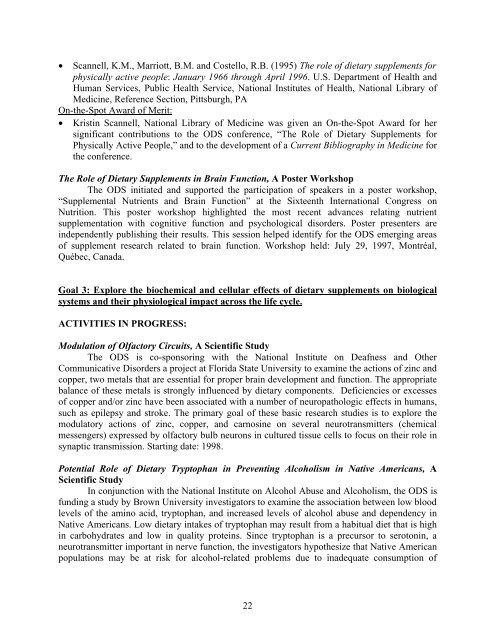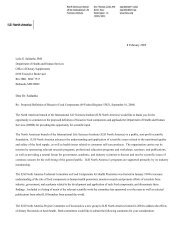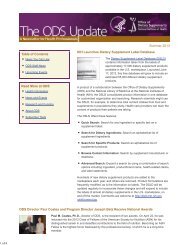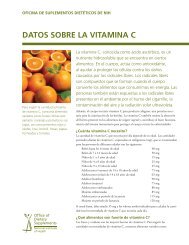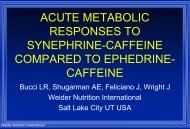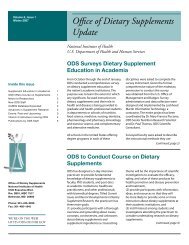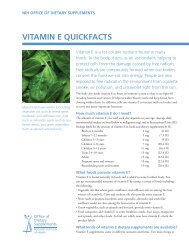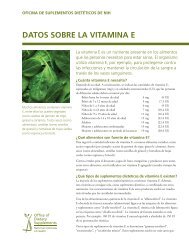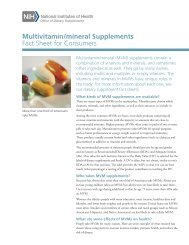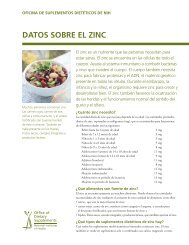status report - Office of Dietary Supplements - National Institutes of ...
status report - Office of Dietary Supplements - National Institutes of ...
status report - Office of Dietary Supplements - National Institutes of ...
Create successful ePaper yourself
Turn your PDF publications into a flip-book with our unique Google optimized e-Paper software.
• Scannell, K.M., Marriott, B.M. and Costello, R.B. (1995) The role <strong>of</strong> dietary supplements for<br />
physically active people: January 1966 through April 1996. U.S. Department <strong>of</strong> Health and<br />
Human Services, Public Health Service, <strong>National</strong> <strong>Institutes</strong> <strong>of</strong> Health, <strong>National</strong> Library <strong>of</strong><br />
Medicine, Reference Section, Pittsburgh, PA<br />
On-the-Spot Award <strong>of</strong> Merit:<br />
• Kristin Scannell, <strong>National</strong> Library <strong>of</strong> Medicine was given an On-the-Spot Award for her<br />
significant contributions to the ODS conference, “The Role <strong>of</strong> <strong>Dietary</strong> <strong>Supplements</strong> for<br />
Physically Active People,” and to the development <strong>of</strong> a Current Bibliography in Medicine for<br />
the conference.<br />
The Role <strong>of</strong> <strong>Dietary</strong> <strong>Supplements</strong> in Brain Function, A Poster Workshop<br />
The ODS initiated and supported the participation <strong>of</strong> speakers in a poster workshop,<br />
“Supplemental Nutrients and Brain Function” at the Sixteenth International Congress on<br />
Nutrition. This poster workshop highlighted the most recent advances relating nutrient<br />
supplementation with cognitive function and psychological disorders. Poster presenters are<br />
independently publishing their results. This session helped identify for the ODS emerging areas<br />
<strong>of</strong> supplement research related to brain function. Workshop held: July 29, 1997, Montréal,<br />
Québec, Canada.<br />
Goal 3: Explore the biochemical and cellular effects <strong>of</strong> dietary supplements on biological<br />
systems and their physiological impact across the life cycle.<br />
ACTIVITIES IN PROGRESS:<br />
Modulation <strong>of</strong> Olfactory Circuits, A Scientific Study<br />
The ODS is co-sponsoring with the <strong>National</strong> Institute on Deafness and Other<br />
Communicative Disorders a project at Florida State University to examine the actions <strong>of</strong> zinc and<br />
copper, two metals that are essential for proper brain development and function. The appropriate<br />
balance <strong>of</strong> these metals is strongly influenced by dietary components. Deficiencies or excesses<br />
<strong>of</strong> copper and/or zinc have been associated with a number <strong>of</strong> neuropathologic effects in humans,<br />
such as epilepsy and stroke. The primary goal <strong>of</strong> these basic research studies is to explore the<br />
modulatory actions <strong>of</strong> zinc, copper, and carnosine on several neurotransmitters (chemical<br />
messengers) expressed by olfactory bulb neurons in cultured tissue cells to focus on their role in<br />
synaptic transmission. Starting date: 1998.<br />
Potential Role <strong>of</strong> <strong>Dietary</strong> Tryptophan in Preventing Alcoholism in Native Americans, A<br />
Scientific Study<br />
In conjunction with the <strong>National</strong> Institute on Alcohol Abuse and Alcoholism, the ODS is<br />
funding a study by Brown University investigators to examine the association between low blood<br />
levels <strong>of</strong> the amino acid, tryptophan, and increased levels <strong>of</strong> alcohol abuse and dependency in<br />
Native Americans. Low dietary intakes <strong>of</strong> tryptophan may result from a habitual diet that is high<br />
in carbohydrates and low in quality proteins. Since tryptophan is a precursor to serotonin, a<br />
neurotransmitter important in nerve function, the investigators hypothesize that Native American<br />
populations may be at risk for alcohol-related problems due to inadequate consumption <strong>of</strong><br />
22


